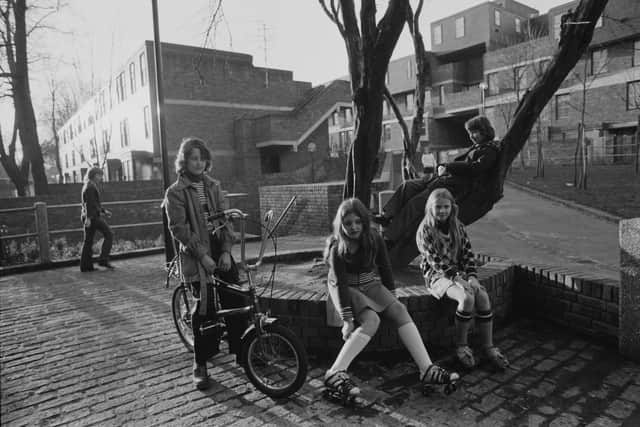With children's confidence and happiness at rock bottom, Education Secretary Jenny Gilruth needs to listen to them before making big changes in Scotland's schools – Susan Dalgety
Are we failing our young people, in particular our girls? A respected study, Health Behaviour in School-aged Children (HBSC), whose latest survey was published this week, suggests we are – big time. The report says that fewer than 20 per cent of children like school “a lot”, with only 15 per cent of girls being wholly positive about their education, compared to 18 per cent of boys.
According to the education magazine TES, this is the first time in a generation that a major survey of young people has found that teenage girls are now less likely than their male peers to enjoy school. The survey also shows that both boys’ and girls’ overall satisfaction with school has plummeted, but perhaps more worryingly, the study – which has been carried out every four years since 1990 – reveals that young people’s self-confidence is at an all-time low. “Trends in young people’s mental health are both striking and concerning, with some outcomes, such as confidence and happiness, being at their lowest point in decades,” states the report. While more than half of boys (56 per cent) reported feeling confident, only 30 per cent of girls said the same.
Advertisement
Hide AdAdvertisement
Hide AdNo doubt some of this unhappiness can be blamed on the pandemic. Not since the Second World War has a generation of young people experienced such terrible disruption to their education as that caused by lockdown, or had to endure long periods of social isolation where FaceTime became the school playground and WhatsApp the youth club.
And things are not back to normal. We had no time to process the impact of the pandemic before the cost-of-living crisis hit. Young people may not control the family purse strings, but they know when their parents are struggling to pay bills or put food on the table. The insecurity that brings can be overwhelming.
Our children come under other pressures too. We live in a much more sexualised society than the one we grew up in during the 1970s, or even the 1990s. Online porn is freely available on every smartphone. A survey last year shows that two-thirds of secondary school pupils in Scotland suffer sexual harassment – the majority girls. And I suggest that revenge porn – where (usually) a boy shares intimate images of his ex-girlfriend with others – is far more prevalent among young people than parents imagine, until that terrible moment when their daughter breaks down.
Then there is gender identity, a relatively new phenomenon, but one that the survey paid heed to by asking S2 and S4 students to give a more “nuanced” response to whether they were male or female. Ten per cent were either trans, non-binary, “another gender” or their gender was “missing”. Tabloid tales of children who identify as cats may make for lurid headlines, but there is no doubt there is a growing number of young people who identify as the opposite sex to that in which they were born.
A fact sheet, published by For Women Scotland, shows that in May last year, 263 children were being treated at Sandyford Young Person's Gender Clinic in Glasgow, with a further 1,086 on the waiting list, including 20 pre-pubertal children. Demand for treatment has increased by over 1,300 per cent since 2013, from just 37 referrals – mostly young boys – to 521 in 2021, predominantly teenage girls.


A decade ago, a 15-year-old girl who found herself sexually attracted to females would have realised she was a lesbian. Today, more often than not, she is encouraged to consider whether she may have been born in the “wrong body” and is in fact male. Little wonder then that fewer than a third of our girls feel confident in themselves, their education disrupted, at risk of sexual assault or exploitation and perfectly normal adolescent questioning about sexual identity distorted by trans activists, keen to prove their queer theories.
So what is to be done for this Covid generation? As parents and grandparents, we can teach our children resilience, helping them to learn how to cope with change and recover from setbacks. But our teenagers spend much of their day at school, and most of their free time with their peers, or online.
Westminster’s Online Safety Bill – expected to become law soon – will go some way to protecting young people from commercial pornography, but revenge porn is homemade exploitation. Do schools, as well as parents, have a bigger role to play in teaching youngsters about safeguarding and respect for each other? Should adults – whether researchers, teachers, or politicians – continue to perpetuate the myth that human beings can change sex? Surely adolescence is a confusing enough time without force-feeding children a controversial ideology.
Advertisement
Hide AdAdvertisement
Hide AdCrucially, what can be done to restore pupils’ confidence in themselves and in their education? A period of stability with a focus on learning, with better support for teachers and pupils alike, would be a start, but the new Education Secretary, Jenny Gilruth, has just announced that there could soon be a “radical shift in Scottish education” if the government decides to adopt the recommendations of Professor Louise Hayward's review of qualifications and assessment.
The minister has promised that teachers will be key to “Scotland’s education reform journey”, a laudable aim no doubt, but surely the most important people in our schools are our children. Before Gilruth takes another step on the road to more change in our schools, I suggest she spends the next few days thinking about what the latest HBSC report means for her plans. Our children are trying to tell us something, and we should all stop and listen.
Comments
Want to join the conversation? Please or to comment on this article.